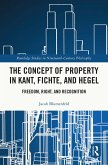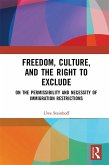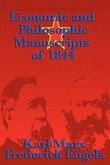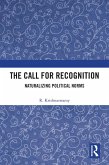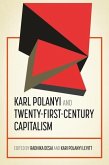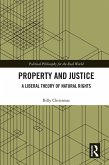The book begins with a critical genealogy of the concept of property in modern legal philosophy, followed by a reconstruction of the theory of property in Kant's Doctrine of Right, Fichte's Foundations of Natural Right, and Hegel's Jena Realphilosophie. By turning to the tradition of German Rechtsphilosophie as opposed to the more standard libertarian and utilitarian frameworks of property, it explores the metaphysical, normative, political, and material questions that make property intelligible as a social relation. The book formulates a normative theory of property rooted in practical reason, mutual recognition, and social freedom. This relational theory of property, inspired by German Idealism, brings a fresh angle to contemporary property theory. Additionally, it provides crucial philosophical background to 19th-century debates on private property, inequality, labor, socialism, capitalism, and the state.
The Concept of Property in Kant, Fichte, and Hegel will appeal to scholars and advanced students interested in 19th-century German philosophy, social and political philosophy, philosophy of law, political theory, and political economy.
Dieser Download kann aus rechtlichen Gründen nur mit Rechnungsadresse in A, B, BG, CY, CZ, D, DK, EW, E, FIN, F, GR, HR, H, IRL, I, LT, L, LR, M, NL, PL, P, R, S, SLO, SK ausgeliefert werden.
Karen Ng, Vanderbilt University
"Jacob Blumenfeld's new work makes a vital contribution to contemporary political philosophy and not just its history. Blumenfeld's stringently argued, nuanced, and irreplaceable book is a critique of narrow economistic and legalist conceptions of property, and an emergent broad concept of property as the switching station through which Kant, Fichte, and Hegel each develop increasingly elaborate accounts of self-conscious freedom and agency as normatively constituted through the property relation as one necessarily involving mutual recognition within a self-determining civil condition. On this account, property relations spell out the conditions for need satisfaction and freedom generally, with the failure to secure the goods property rights protect leading to homelessness, unemployment, overwork, and poverty."
J.M. Bernstein, The New School for Social Research
"Jacob Blumenfeld's original, insightful, and thoroughly researched study of the concept of property in Kant, Fichte and Hegel challenges standard legal and economic justifications of property. Blumenfeld not only offers a penetrating historical reconstruction of the theories of property developed by Kant, Fichte and the early Hegel, he also creatively draws on key insights from each to defend a social-normative framework for addressing property rights, one that attends to the moral injuries of the propertyless: homelessness, unemployment, overwork, and poverty. In sum, Blumenfeld's timely and important study calls for us to radically re-consider the normative function of property in our lives along more social, if not socialist lines."
Gabe Gottlieb, Xavier University



